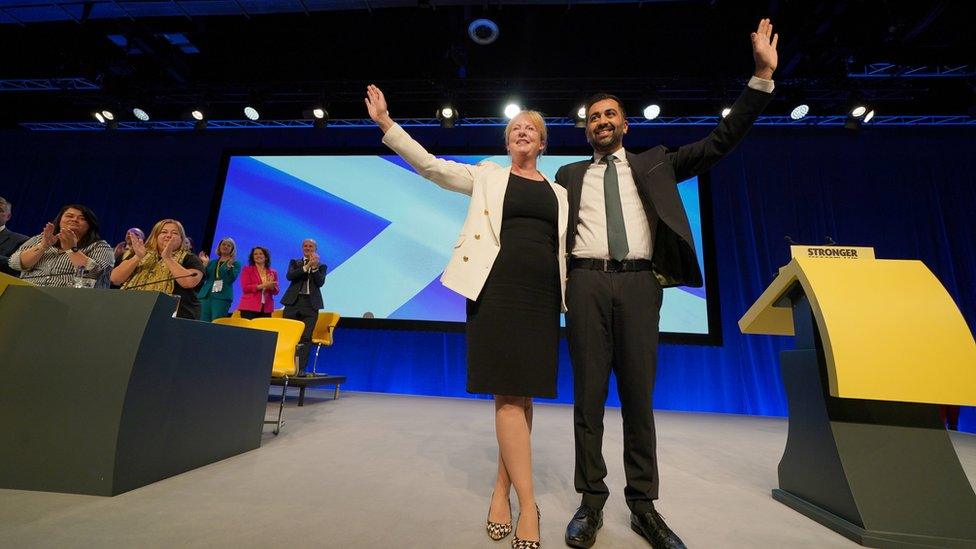Inverclyde agrees council tax freeze after government talks
- Published

Humza Yousaf announced a council tax freeze at the SNP conference in October
Inverclyde Council has agreed to effectively freeze its council tax despite initially defying the Scottish government.
The local authority has received an additional £2.9m worth of funding from Holyrood to offset a planned 8.2% rise in the charge.
Humza Yousaf had announced a national council tax freeze at the SNP conference in October.
But the timing of the decision means bills will still rise in April.
However, new bills will then be sent out which take account of this.
The council's policy and resources committee approved the "credit" for about 29,000 council tax accounts at a meeting on Tuesday.
New bills will be calculated and distributed to households by letter or online during May, depending on how they have opted to receive their council tax bills.
Inverclyde, along with Argyll and Bute, had previously agreed to defy proposals outlined by the first minister last month.
They had also agreed to a 6% hike in the year 2025/26.
It would have meant properties in Band A paying an extra £1.50 a week and those in Band D going up by £117 to £1547 a year - a rise of £2.25 a week.
Council relationship 'badly damaged'
The council, which is Labour-run without a majority, said it had opted to increase the charge in order to "minimise cuts to jobs and services".
Its policy and resources convener, Councillor Stephen McCabe, said the government had "badly damaged its relationship" with local authority governing body Cosla and urged them to take lessons from the negotiations.
He added that the council had taken the "right decision at the time" but urged the first minister not to implement any further freezes for the remainder of the current parliament's life.
Councillor McCabe said: "We lobbied the government for that money because it was earmarked specifically for Inverclyde and belongs to the people of Inverclyde who pay their taxes.
"I really do hope that the Scottish government learns a lesson from this year's budget process. They may have secured a national council tax freeze but that has come at a significant price.
"They have badly damaged their relationship with Cosla and local government more generally. They have forced councils and integrated joint boards to implement significant budget cuts and they have pushed councils one step closer to effective bankruptcy."
Financial pressure
About 2,300 of Inverclyde's 40,000 households are already exempt from paying council tax and a further 9,000 do not pay any more if there are increases as they are already in receipt of council tax reduction.
Councillors in Argyll and Bute are also expected to reverse a decision to increase the charge when they meet in a fortnight.
A Scottish government spokesperson said: "Scottish ministers are aware that many councils are under financial pressure, which is why the 2024-25 Scottish budget provides record funding for local government of over £14bn.
"The Scottish government has provided a real terms increase in revenue funding for local government in both 2022-23 and 2023-24, as confirmed by the Accounts Commission.
"Decisions on local government budget allocations for future years are subject to the outcome of negotiations with Cosla, the results of which will be confirmed in future Scottish budgets. Any assumptions relating to possible future budget reductions are entirely speculative at this stage."


Achieving a national council tax freeze has been easier said than done this year. It has been a fraught process.
The manner in which the freeze was announced by First Minister Humza Yousaf at the SNP conference took councils aback.
They had not expected it and some considered the unexpected announcement to be a breach of the Verity House Agreement - an agreement which was meant to improve the relationship between the Scottish government and councils.
Then came rows over whether the Scottish government was offering councils enough to compensate them for freezing the tax.
At its root is a big question. Is local government subservient to the Scottish government or does it have a sufficient degree of autonomy to decide on how to provide and fund local services?
Councils are heavily dependent on Scottish government cash and some of it is earmarked for specific services such as education.
Some would argue councils need more financial powers so they can better meet the needs of the communities they serve.
They already have some new ones - for instance the right to charge double council tax on second homes. Progress is being made towards introducing a "hotel bedroom charge" or visitor levy in the next few years.
But this year has demonstrated the power of central government can hold over local government.
Ultimately, it is hard for a council to say no to government cash.